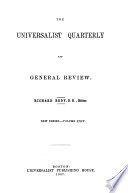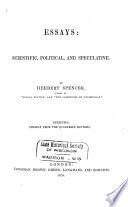 | 1857 - 602 pages
...lies the explanation of this universal transformation of the homogeneous into the heterogeneous. Thus much premised, we pass at once to the statement of the law, which is this : Eoery active force produces more than one change — every cause produces more than one effect. Before... | |
 | 1887 - 544 pages
...These two universal laws apply to the phenomena of mind not less than to those of physical nature. " Every active force produces more than one change —every cause produces more than one effect." These are universal laws, and by them the change from the homogeneous or simple to the heterogeneous... | |
 | 1857 - 588 pages
...5, the organization of industry; 6, the progress of language, &c. The law of this progress is — " Every active force produces more than one change; every cause produces more than one effect." This is again shown in special instances of the above-mentioned items, and the lesson deduced is, that... | |
 | John Holmes Agnew, Walter Hilliard Bidwell - 1857 - 624 pages
...lies the explanation of this universal transformation of the homogeneous into the heterogeneous. Thus much premised, we pass at once to the statement of the law, which is this : Ecery active force produces more than one change — eoery cause produces more than one effect. Betore... | |
 | Herbert Spencer - 1858 - 460 pages
...lies the explanation of this universal transformation of the homogeneous into the heterogeneous. Thus much premised, we pass at once to the statement of...more than one effect. Before this law can be duly comprehendcd, a few examples must be looked at. When one body is struck against another, that which... | |
 | Herbert Spencer - 1858 - 466 pages
...of this universal transformation of the homogeneous into the heterogeneous. Thus much premised, \ve pass at once to the statement of the law, which is...this :—Every active force produces more than one change—every cause produces more than one effect. Before this law can be duly comprehended, a few... | |
 | Alexander Del Mar - 1865 - 902 pages
...that the same rules which hold good in physical phenomena, hold true in the social organism : that " every active " force produces more than one change ; every cause produces " more than one effect/' Simple as this law appears, it is a comprehensive truth of the greatest magnitude, and one which is... | |
 | Théodule Ribot - 1874 - 352 pages
...which explains the universal transformation of the homogeneous into the heterogeneous, is as follows : Every active force produces more than one change; every cause produces more than one effect. One body strikes another; to our eyes the effect consists in a change in the position or the motion... | |
 | James Hinton - 1874 - 644 pages
...effected by the re-occurrence of it. Let me look at this double relation. — H. Spencer says that ' Every active force produces more than one change ; every cause produces more than one effect.' .Is not this what I have noted ? ' that force divides dichotomously,' that a conversion is never complete.... | |
 | 1887 - 340 pages
...imparted to the mass, the equilibrium has been disturbed, and has become a " moving equilibrium.'' " Every active force produces more than one change — every cause produces more than one effect." * The scientific method is the " active force ; " the changes it has produced and will continue to... | |
| |